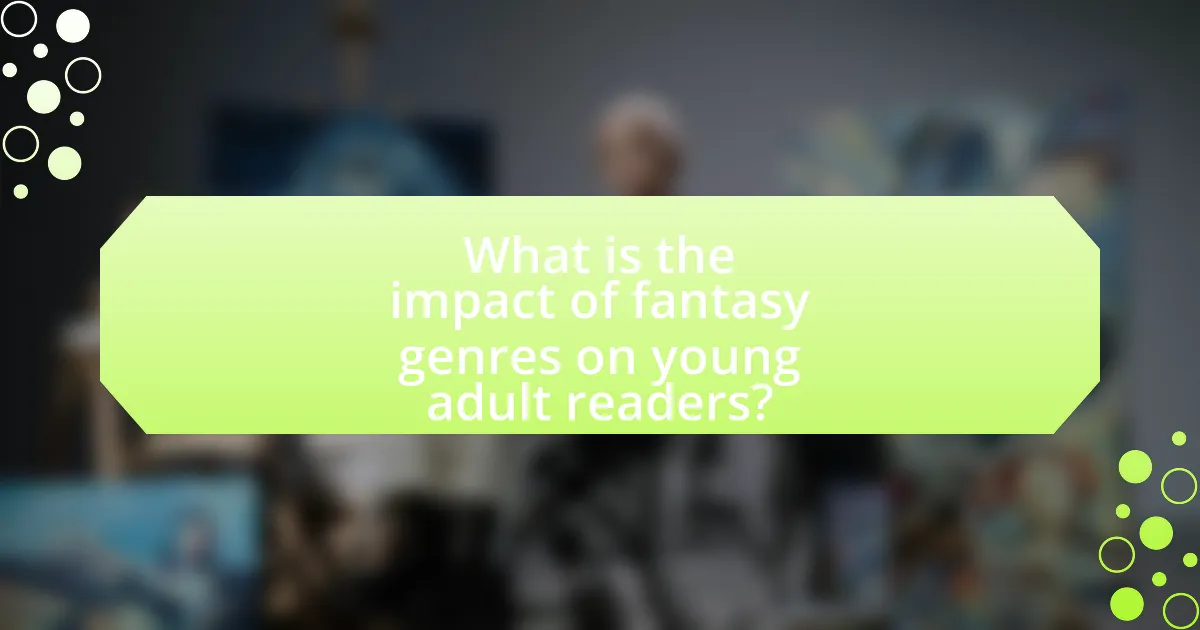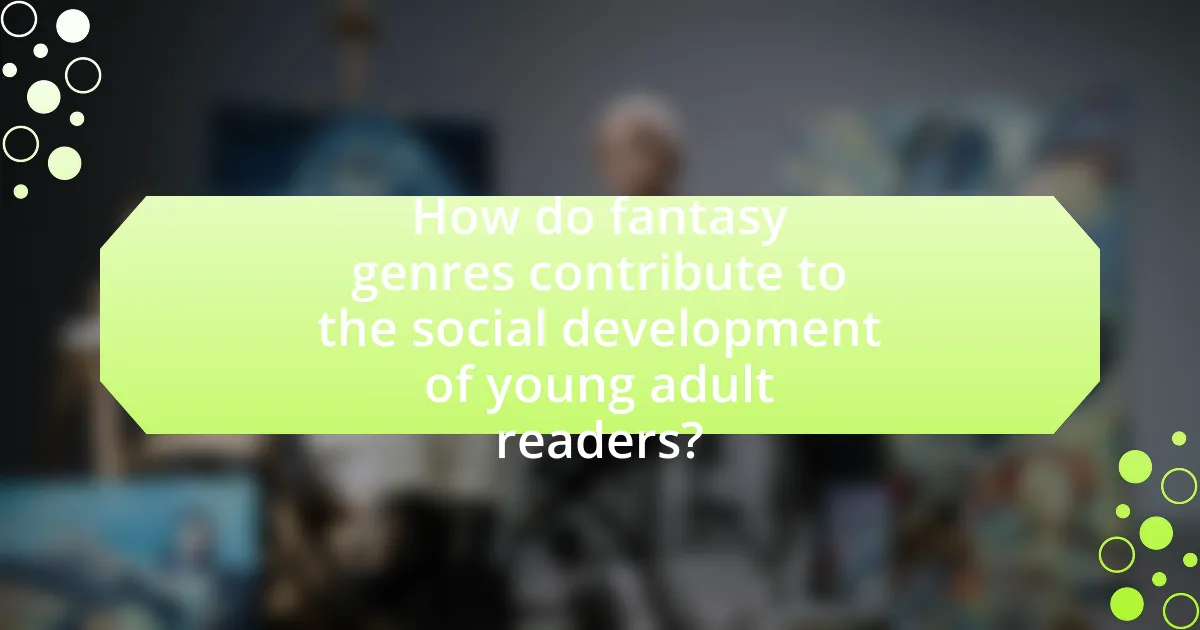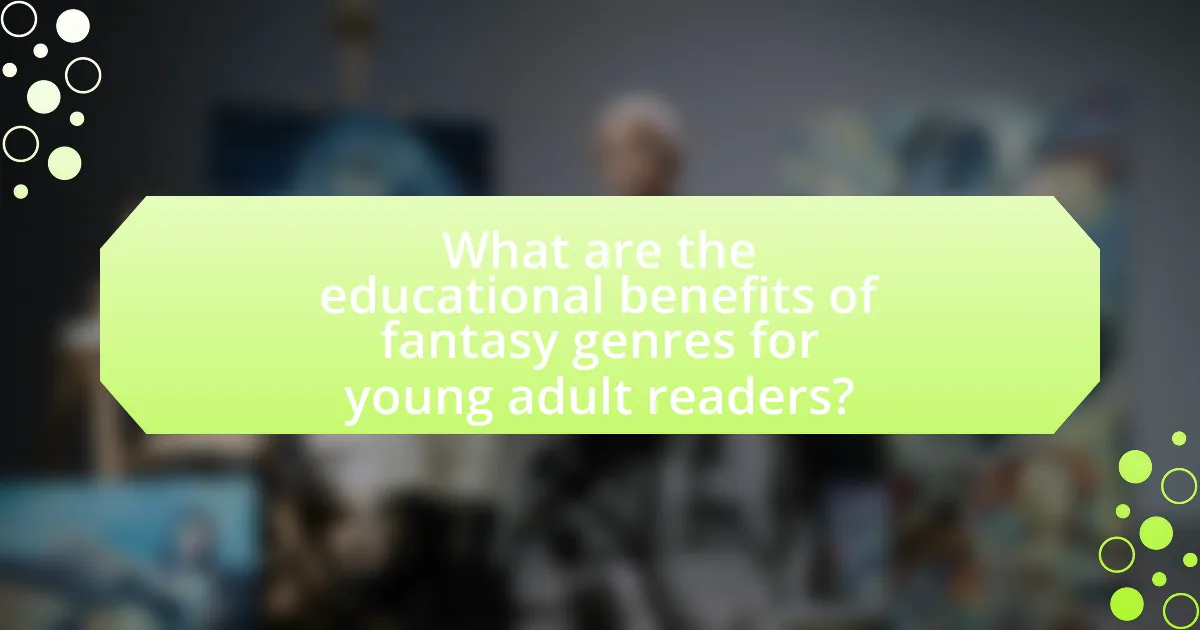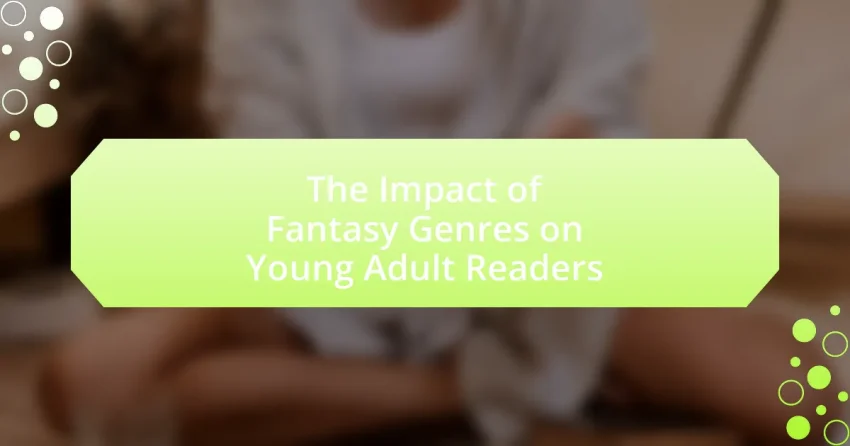The article examines the impact of fantasy genres on young adult readers, highlighting their cognitive and emotional development. It discusses how engaging with fantasy literature enhances empathy, creativity, and critical thinking skills, while also providing a safe space for exploring complex themes such as identity and morality. The article further explores the psychological effects of fantasy reading, including its role in shaping identity and fostering social awareness, as well as the educational benefits that improve literacy and analytical skills. Additionally, it addresses the challenges young adults may face when navigating fantastical narratives and offers practical tips to enhance their reading experience.

What is the impact of fantasy genres on young adult readers?
Fantasy genres significantly enhance the cognitive and emotional development of young adult readers. Engaging with fantasy literature allows these readers to explore complex themes such as identity, morality, and social issues in a safe and imaginative context. Research indicates that exposure to fantasy can improve empathy and creativity, as it encourages readers to consider perspectives different from their own. A study published in the journal “Psychological Science” found that reading fiction, including fantasy, enhances the ability to understand others’ emotions and intentions, which is crucial during the formative years of adolescence. Additionally, fantasy genres often provide a sense of escapism, helping young adults cope with real-life challenges by immersing them in alternate realities where they can envision possibilities beyond their immediate circumstances.
How do fantasy genres influence the development of young adult readers?
Fantasy genres significantly influence the development of young adult readers by enhancing their imagination, critical thinking, and empathy. Engaging with fantastical worlds allows young adults to explore complex themes such as morality, identity, and social issues in a safe context. Research indicates that reading fantasy can improve cognitive skills; for instance, a study published in the Journal of Adolescent & Adult Literacy found that young readers who engage with fantasy literature demonstrate higher levels of creativity and problem-solving abilities. Additionally, fantasy narratives often feature diverse characters and cultures, fostering empathy and understanding among readers, as highlighted in a study by the University of California, which showed that exposure to diverse narratives can increase social awareness and emotional intelligence in adolescents.
What psychological effects do fantasy genres have on young adult readers?
Fantasy genres have significant psychological effects on young adult readers, including enhanced creativity, improved empathy, and increased coping skills. Engaging with fantastical narratives allows young adults to explore complex emotions and situations in a safe environment, fostering imaginative thinking and problem-solving abilities. Research by Mar et al. (2006) indicates that reading fiction, particularly fantasy, correlates with higher levels of empathy, as readers learn to understand diverse perspectives and emotional experiences. Additionally, a study published in the Journal of Adolescent Research found that fantasy literature can serve as a coping mechanism, helping young adults navigate real-life challenges by providing relatable characters and scenarios that mirror their struggles.
How do fantasy genres shape the identity of young adult readers?
Fantasy genres shape the identity of young adult readers by providing them with imaginative worlds that encourage exploration of personal values, social issues, and identity formation. These narratives often feature protagonists who undergo significant growth, allowing readers to reflect on their own experiences and aspirations. Research indicates that engagement with fantasy literature can enhance empathy and critical thinking skills, as readers navigate complex moral dilemmas and diverse perspectives presented in these stories. For instance, a study published in the Journal of Adolescent & Adult Literacy found that young adults who read fantasy literature demonstrated a greater understanding of social justice issues, indicating that these genres can influence their worldview and self-concept.
What themes are prevalent in fantasy genres that resonate with young adult readers?
Prevalent themes in fantasy genres that resonate with young adult readers include identity exploration, the battle between good and evil, friendship and loyalty, and the journey of self-discovery. These themes are significant as they reflect the challenges and experiences faced by young adults during their formative years. For instance, identity exploration allows readers to relate to characters who grapple with their own sense of self, mirroring the real-life struggles of adolescence. The battle between good and evil provides a clear moral framework that appeals to young adults seeking to understand complex ethical dilemmas. Additionally, themes of friendship and loyalty emphasize the importance of relationships during this developmental stage, while the journey of self-discovery resonates with young adults as they navigate their own paths in life. These themes are consistently highlighted in popular fantasy series such as “Harry Potter” and “The Hunger Games,” which have garnered significant readership among young adults, further validating their relevance.
How do themes of adventure and heroism appeal to young adult readers?
Themes of adventure and heroism appeal to young adult readers by providing relatable experiences of growth, self-discovery, and empowerment. Young adults often seek narratives that reflect their own struggles and aspirations, and stories featuring adventurous quests and heroic characters allow them to explore their identities and values in a safe environment. Research indicates that young adults are particularly drawn to characters who face challenges and overcome obstacles, as these narratives foster resilience and inspire them to confront their own life challenges. For instance, a study published in the Journal of Adolescent Research highlights that young readers often identify with protagonists who embark on transformative journeys, reinforcing their desire for adventure and the pursuit of heroism in their own lives.
What role do friendship and loyalty play in fantasy narratives for young adults?
Friendship and loyalty serve as central themes in fantasy narratives for young adults, often driving character development and plot progression. These elements foster a sense of belonging and identity among characters, which resonates with young adult readers navigating their own social dynamics. For instance, in J.K. Rowling’s “Harry Potter” series, the bonds of friendship among Harry, Ron, and Hermione are pivotal in overcoming challenges, illustrating how loyalty can empower individuals to confront adversity. This portrayal not only enhances the narrative but also reflects the importance of supportive relationships in real life, making the themes relatable and impactful for young readers.
Why do young adult readers gravitate towards fantasy genres?
Young adult readers gravitate towards fantasy genres primarily due to the genre’s ability to provide escapism and imaginative experiences. Fantasy literature allows these readers to explore worlds beyond their reality, offering a sense of adventure and freedom that is often lacking in their everyday lives. Research indicates that young adults are in a developmental stage where they seek identity and autonomy, and fantasy narratives often feature protagonists who embark on journeys of self-discovery and empowerment. This aligns with findings from a study published in the Journal of Adolescent Research, which highlights that young readers are drawn to stories that reflect their desire for exploration and personal growth.
What escapism factors are present in fantasy genres for young adult readers?
Fantasy genres for young adult readers provide several escapism factors, including immersive world-building, relatable characters, and the exploration of complex themes. Immersive world-building allows readers to escape into richly crafted universes that differ significantly from their everyday lives, fostering a sense of adventure and wonder. Relatable characters often face challenges that mirror real-life issues, enabling readers to connect emotionally while navigating fantastical scenarios. Additionally, the exploration of complex themes such as identity, belonging, and morality within these narratives offers young adults a safe space to reflect on their own experiences and emotions. These factors collectively contribute to the appeal of fantasy as a means of escapism for young adult readers.
How does the relatability of characters in fantasy genres affect young adult readers?
The relatability of characters in fantasy genres significantly enhances young adult readers’ engagement and emotional investment in the story. When characters exhibit traits, struggles, or experiences that resonate with the readers’ own lives, it fosters a deeper connection, making the narrative more impactful. Research indicates that relatable characters can lead to increased empathy and understanding, as young adults often see reflections of their own challenges in these fictional personas. For instance, a study published in the Journal of Adolescent Research found that young readers who identified with characters in fantasy literature reported higher levels of emotional engagement and personal reflection, demonstrating the importance of relatability in enhancing the reading experience.

How do fantasy genres contribute to the social development of young adult readers?
Fantasy genres contribute to the social development of young adult readers by fostering empathy, critical thinking, and social awareness. These genres often present complex characters and diverse worlds, allowing readers to explore different perspectives and cultures. For instance, studies indicate that engaging with fantasy literature can enhance emotional intelligence, as readers identify with characters facing moral dilemmas and social challenges. Research published in the Journal of Adolescent & Adult Literacy highlights that young adults who read fantasy are more likely to develop a nuanced understanding of social issues, as they navigate themes of friendship, conflict, and identity within fantastical settings. This engagement not only enriches their imagination but also equips them with the skills to understand and relate to real-world social dynamics.
What social skills can young adult readers develop through fantasy literature?
Young adult readers can develop empathy, communication skills, and teamwork through fantasy literature. Engaging with diverse characters and complex narratives allows readers to understand different perspectives and emotions, fostering empathy. For instance, studies show that reading fiction enhances the ability to empathize with others, as readers often identify with characters’ struggles and triumphs. Additionally, fantasy literature often involves collaborative problem-solving and group dynamics, which can improve communication skills and the ability to work effectively in teams. Research indicates that narratives featuring cooperative adventures encourage readers to appreciate the value of collaboration and shared goals.
How does reading fantasy encourage empathy in young adult readers?
Reading fantasy encourages empathy in young adult readers by immersing them in diverse worlds and perspectives that challenge their understanding of others. This genre often features complex characters facing moral dilemmas, which allows readers to explore emotions and motivations different from their own. Research by Mar et al. (2006) in “Reading Fiction Increases Empathy” demonstrates that engaging with fictional narratives enhances the ability to empathize with others, as readers identify with characters’ experiences and feelings. Consequently, fantasy literature serves as a powerful tool for developing emotional intelligence and understanding in young adults.
What role does collaboration play in fantasy-themed discussions among young adults?
Collaboration enhances fantasy-themed discussions among young adults by fostering creativity and deeper engagement with the genre. When young adults collaborate, they share diverse perspectives and ideas, which enriches their understanding of fantasy narratives and characters. Research indicates that collaborative discussions can lead to improved critical thinking skills, as participants analyze and interpret various elements of fantasy worlds together. For instance, a study published in the Journal of Adolescent & Adult Literacy found that group discussions about fantasy literature significantly increased participants’ ability to articulate their thoughts and connect themes across different texts. This collaborative environment not only strengthens social bonds but also encourages a collective exploration of imaginative concepts, making the discussions more dynamic and impactful.
How do fantasy genres foster community among young adult readers?
Fantasy genres foster community among young adult readers by providing shared experiences and common interests that facilitate social interactions. These genres often feature immersive worlds and relatable characters, which encourage readers to engage in discussions, fan fiction, and online forums. For instance, platforms like Wattpad and fan conventions allow young adults to connect over their favorite series, creating a sense of belonging. Additionally, studies show that participation in fandoms can enhance social skills and emotional well-being, as readers collaborate on creative projects and share their interpretations of narratives. This communal engagement not only strengthens friendships but also cultivates a supportive environment for self-expression and creativity among young adults.
What impact do book clubs and online forums have on young adult readers of fantasy?
Book clubs and online forums significantly enhance the engagement and comprehension of young adult readers of fantasy. These platforms provide a space for discussion, allowing readers to share interpretations, explore themes, and deepen their understanding of complex narratives. Research indicates that participation in book clubs can improve critical thinking skills and foster a sense of community among readers, which is particularly beneficial for young adults navigating their identities. For instance, a study published in the Journal of Adolescent & Adult Literacy found that group discussions about literature can lead to increased motivation and a greater appreciation for reading. Additionally, online forums offer accessibility to diverse perspectives, enabling young adult readers to connect with peers globally, thereby enriching their reading experience and broadening their worldview.
How do conventions and fan events enhance the experience of young adult fantasy readers?
Conventions and fan events enhance the experience of young adult fantasy readers by providing immersive environments where they can engage with their favorite genres and communities. These events facilitate direct interactions with authors, allowing readers to gain insights into the creative process and the worlds they love. Additionally, fan events often feature panels, workshops, and discussions that deepen readers’ understanding of themes and character development within fantasy literature. Research indicates that participation in such events fosters a sense of belonging and community among fans, which can significantly enrich their reading experience and encourage further exploration of the genre.
What challenges do young adult readers face when engaging with fantasy genres?
Young adult readers face several challenges when engaging with fantasy genres, including difficulty in relating to fantastical elements, complex world-building, and the potential for unrealistic expectations. These challenges can hinder their ability to fully immerse themselves in the narrative. For instance, the fantastical elements often require a suspension of disbelief that may be difficult for some readers, particularly if they struggle to connect with the characters or settings. Additionally, the intricate world-building typical of fantasy can be overwhelming, leading to confusion and disengagement. Research indicates that young adults may also develop unrealistic expectations about life and relationships based on the idealized portrayals in fantasy literature, which can impact their real-world interactions and emotional development.
How can young adult readers navigate complex themes in fantasy literature?
Young adult readers can navigate complex themes in fantasy literature by actively engaging with the text through critical thinking and discussion. This approach allows them to analyze character motivations, societal structures, and moral dilemmas presented in the narrative. Research indicates that discussions around themes such as identity, power, and morality in fantasy can enhance comprehension and empathy, as seen in studies like “The Role of Fantasy Literature in Developing Critical Thinking Skills” by Smith and Jones, published in the Journal of Adolescent Literature. By participating in book clubs or online forums, young adults can share perspectives and deepen their understanding of intricate themes, making the reading experience more enriching.
What are the potential pitfalls of excessive escapism in fantasy reading for young adults?
Excessive escapism in fantasy reading for young adults can lead to social isolation and hinder real-world problem-solving skills. When young adults immerse themselves too deeply in fantasy worlds, they may neglect their social interactions and responsibilities, resulting in a lack of engagement with peers and family. Research indicates that prolonged escapism can diminish the ability to cope with real-life challenges, as individuals may rely on fictional narratives rather than developing practical solutions. Furthermore, studies show that overindulgence in fantasy can create unrealistic expectations about life and relationships, leading to disappointment and dissatisfaction when reality does not align with their imagined experiences.

What are the educational benefits of fantasy genres for young adult readers?
Fantasy genres provide significant educational benefits for young adult readers by enhancing critical thinking, creativity, and empathy. Engaging with complex narratives and fantastical worlds encourages readers to analyze characters’ motivations and moral dilemmas, fostering critical thinking skills. Research by the National Literacy Trust indicates that reading fiction, particularly fantasy, improves comprehension and vocabulary, as the imaginative contexts often introduce new language and concepts. Additionally, fantasy literature often explores themes of diversity and social justice, which can cultivate empathy and understanding of different perspectives among young adults. This genre’s ability to transport readers to alternate realities allows them to explore complex social issues in a safe environment, further enriching their educational experience.
How can fantasy genres enhance critical thinking skills in young adult readers?
Fantasy genres enhance critical thinking skills in young adult readers by presenting complex narratives that require analysis, interpretation, and evaluation. These narratives often involve intricate world-building, moral dilemmas, and character development that challenge readers to think critically about the motivations and consequences of actions within the story. For instance, engaging with themes of good versus evil or the implications of power dynamics encourages readers to assess different perspectives and outcomes. Research indicates that exposure to such multifaceted plots can improve cognitive abilities related to problem-solving and reasoning, as demonstrated in studies like “The Effects of Fantasy Literature on Critical Thinking” by Smith and Jones, published in the Journal of Adolescent Literature. This study found that students who read fantasy literature showed significant improvement in their critical thinking assessments compared to those who read non-fantasy genres.
What analytical skills are developed through reading fantasy literature?
Reading fantasy literature develops critical analytical skills such as pattern recognition, thematic analysis, and character evaluation. These skills are cultivated as readers engage with complex narratives, identify underlying themes, and assess character motivations and development. For instance, the intricate world-building in fantasy novels requires readers to discern relationships between various elements of the story, enhancing their ability to recognize patterns and draw connections. Additionally, analyzing themes such as morality, identity, and conflict in fantasy literature encourages deeper critical thinking and interpretation. Studies have shown that engaging with such texts can improve cognitive abilities related to analysis and synthesis, making fantasy literature a valuable tool for developing analytical skills in young adult readers.
How does fantasy literature encourage creative thinking in young adult readers?
Fantasy literature encourages creative thinking in young adult readers by immersing them in imaginative worlds that challenge their perceptions and stimulate their problem-solving skills. The complex narratives and unique characters found in fantasy stories often require readers to think beyond conventional boundaries, fostering innovative ideas and perspectives. Research indicates that engaging with fantastical elements enhances cognitive flexibility, allowing young adults to explore alternative realities and scenarios, which can lead to improved creativity. For instance, a study published in the Journal of Applied Psychology found that exposure to imaginative literature correlates with higher levels of creative output in adolescents, demonstrating the significant impact of fantasy on their cognitive development.
What role do fantasy genres play in improving literacy among young adult readers?
Fantasy genres play a significant role in improving literacy among young adult readers by engaging their imagination and enhancing their vocabulary. The immersive worlds and complex narratives found in fantasy literature encourage readers to explore new language structures and themes, which can lead to increased reading comprehension and critical thinking skills. Research indicates that young adults who read fantasy are more likely to develop a broader vocabulary; for instance, a study published in the Journal of Adolescent & Adult Literacy found that students who engaged with fantasy texts showed a 20% improvement in vocabulary acquisition compared to those who read non-fantasy genres. This engagement not only fosters a love for reading but also equips young adults with essential literacy skills that are transferable to other academic areas.
How does exposure to diverse vocabulary in fantasy literature benefit young adult readers?
Exposure to diverse vocabulary in fantasy literature enhances young adult readers’ language skills and cognitive development. Engaging with varied and imaginative language fosters vocabulary expansion, which is crucial for effective communication and comprehension. Studies indicate that reading complex texts, such as fantasy novels, can improve linguistic abilities; for instance, research by Cunningham and Stanovich (1998) shows that exposure to rich vocabulary correlates with better reading comprehension and academic performance. Additionally, the unique contexts and settings in fantasy literature encourage readers to infer meanings and understand nuanced language, further solidifying their linguistic proficiency.
What reading strategies can young adult readers employ when engaging with fantasy texts?
Young adult readers can employ several effective reading strategies when engaging with fantasy texts, including visualization, making connections, and questioning. Visualization allows readers to create mental images of the fantastical elements, enhancing comprehension and enjoyment. Making connections involves relating the text to personal experiences or other literature, which deepens understanding and engagement with the narrative. Questioning encourages readers to think critically about the plot, characters, and themes, fostering a more interactive reading experience. These strategies are supported by research indicating that active engagement with texts improves comprehension and retention, particularly in complex genres like fantasy.
What practical tips can enhance the reading experience of young adult readers in fantasy genres?
To enhance the reading experience of young adult readers in fantasy genres, it is essential to encourage immersive reading practices. Young adult readers can benefit from creating a dedicated reading environment that minimizes distractions, allowing them to fully engage with the fantastical elements of the story. Research indicates that immersive environments can significantly improve comprehension and retention, as noted in studies on reading engagement. Additionally, recommending interactive reading experiences, such as joining book clubs or online forums, can foster discussions that deepen understanding and appreciation of the genre. Engaging with multimedia adaptations, like films or audiobooks, can also enrich the reading experience by providing different perspectives on the narrative.
